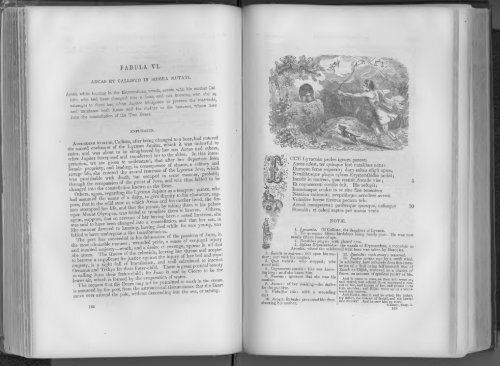THE METAMORPHOSES OF PUBLIUS OVIDIUS NASO
THE METAMORPHOSES OF PUBLIUS OVIDIUS NASO
THE METAMORPHOSES OF PUBLIUS OVIDIUS NASO
Create successful ePaper yourself
Turn your PDF publications into a flip-book with our unique Google optimized e-Paper software.
" T<br />
FABULA VI.<br />
ARCAS ET CALLISTO IN SIDERA MUTATI.<br />
Areas, while hunting in the Erymanthian woods, meets with his mother Cal<br />
listo, who had been changed into a bear, and not knowing who she is,<br />
attempts to shoot her, when Jupiter int rposes to prevent the matricide,<br />
and translates both Areas and his mother to the heavens, where they<br />
form the constellation of the Two Bears.<br />
EXPLICATIO.<br />
ACCORDING to some, Callisto, after being changed to a bear, had entered<br />
the sacred enclosure of the Lycffian Jupiter, which it was unlawful to<br />
enter, and was about to be slaughtered by her son Areas and others,<br />
when Jupiter interposed and transferred her to the skies. In this inter<br />
pretation, we are given to understand, that after her departure from<br />
female propriety, and leading, in consequence of shame, a solitary and<br />
savage life, she entered the sacred temenus of the Lyccean Jove, which<br />
was punishable with death, but escaped in some manner, probably<br />
through the compassion of the priest of Jove, and was thus fabled to be<br />
changed into the constellation known as the Bear.<br />
Others, again, regarding the Lyctean Jupiter as a temporal prince, who<br />
had assumed the name of a deity, to give dignity to his character, sup<br />
pose, that in the wild state in which Areas and his mother lived, the for<br />
mer attempted her life, and that the prince, by taking them to his palace<br />
upon Mount Olympus, was fabled to translate them to heaven. Others,<br />
again, suppose, that on account of her having been a noted huntress, she<br />
was said to have been changed into a constellation, and that her son, in<br />
like manner devoted to hunting, having died while he was young, was<br />
fabled to have undergone a like transformation.<br />
The poet has succeeded in his delineation of the passions of Juno, in<br />
the most admirable manner; wounded pride, a sense of conjugal injury<br />
and insulted majesty wrath, and a desire of revenge, appear in all that<br />
she utters. The Queen of the celestials, leaving her throne and sceptre<br />
to become a supplicant for justice against the injury of her bed and royal<br />
majesty, is a sight full of humiliation, and well calculated to interest<br />
Oceanus and Tethys for their foster-child. There is great poetical beauty<br />
in calling Juno their foster-child; for Juno is said by Cicero to be the<br />
lower air, which is formed by the evaporation of water.<br />
The request that the Bears may n t be permitted to \\ash in the ocean,<br />
is assumed by the poet, from the astronomical circumstance that the Bears<br />
move ever around the pole, without descending into the sea, or setting.<br />
162<br />
'II<br />
CCE Lycaonise proles ignara parenti<br />
Areas adest, ter quinque fere natalibus nctis:<br />
Dumque feras sequitur; dum saltus eligit aptos,<br />
Nexilibusque plagis sylvas Erymanthidas ambit;<br />
Incidit in matrem, quse restitit Arcade viso; 5<br />
Et cognoscenti similis fuit. Ille refugit;<br />
Immotosque oculos in se sine fine tenentem<br />
Nescius extimuit; propriusque accedere aventi<br />
Vulnifico fuerat fixurus pectora telo.<br />
Arcuit omnipotens; pariterque ipsosque, nefasque 10<br />
Sustulit; et celeri raptos per inania vento<br />
NOTJE.<br />
1. Js/caonia. Of Callisto, the daughter of Lycaon.<br />
2. Ter quinque: fifteen birthdays being nearly past. He was now<br />
nearly fifteen years of age.<br />
4. fiexihbtts plagi : with plaited nets.<br />
4. Sylvas Erymanihidas: the woods of Erymanthus, a mountain in<br />
Arcadia, where the celebrated wild-boar was taken by Hercules.<br />
5. Incidit in matrem: fell upon his mo- 11. Sustulit: took away; removed,<br />
ther; met with his mother. 11. Haptos vento: rapt by a swift wind.<br />
5. Qua rcslitit: who stopped; who In sublimity, how infinitely does this transstood<br />
still. lation of a frail being fall beneath that of<br />
6. Cognoscenti similis : like one know- Enoch or Elijah, removed in a chariot of<br />
ing him; as if she knew him. flame, on account of spotless purity of life.<br />
8. Nescius: ignorant that she was his And it came to pag9j as they ,liu wem on><br />
mother. _ an,l talked, that behold, there appeared a chn-<br />
8. Aventi : of her desiring the dative not of fire, and horses of fire, and purled them<br />
for the genitive. b * asunder; and Elijah went up by a wliirl-<br />
9. Vulnijico tdo: with a wounding wind into heaven. _ *„,,.<br />
j f J & And Elisha saw it, and he cried, My father,<br />
in 10. Arcatt: A • forbade; r u j prevented j i.- him from r T men father, thereof! the chariot And he of saw Israel, him no and more, the horseshooting<br />
his mother. 2 KINGS, chap. >i.<br />
163<br />
f













